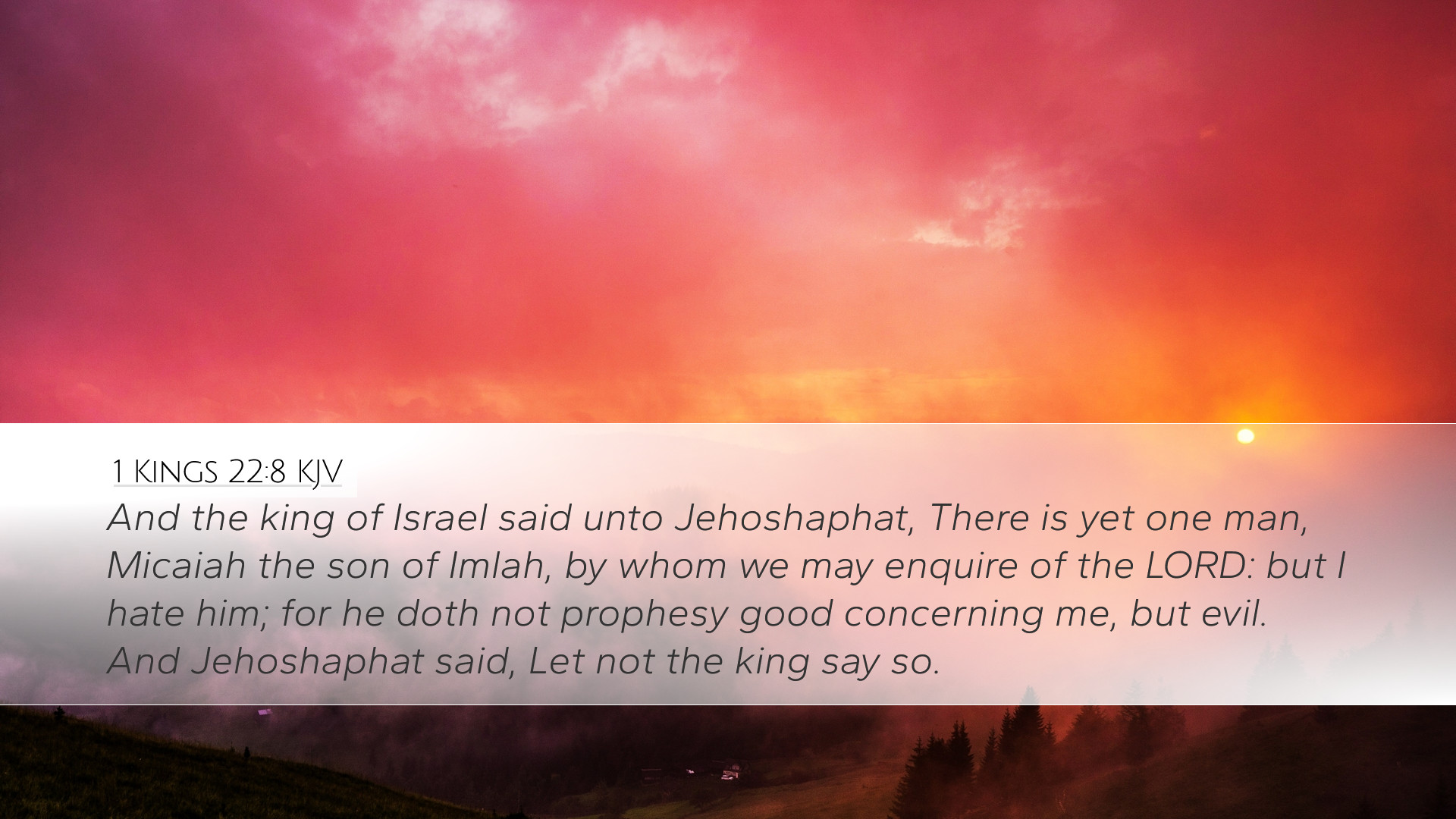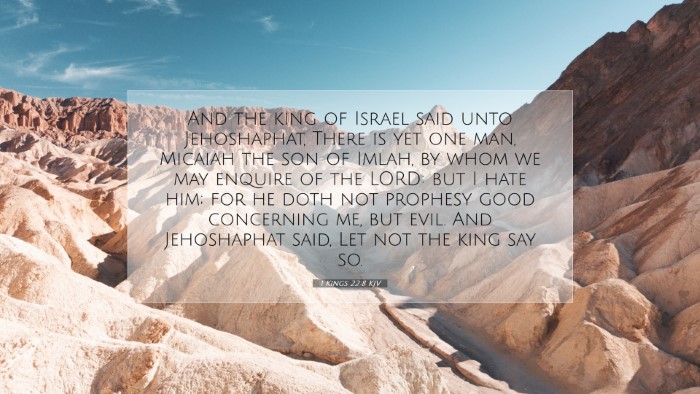Commentary on 1 Kings 22:8
Verse Text: "And the king of Israel said unto Jehoshaphat, There is yet one man, Micaiah the son of Imlah, by whom we may inquire of the LORD: but I hate him; for he doth not prophesy good concerning me, but evil. And Jehoshaphat said, Let not the king say so."
Introduction
This passage presents a critical moment in the narrative of the monarchy of Israel, shedding light on the character of King Ahab and the dynamics of his relationship with the prophets. It introduces Micaiah, a prophet who becomes pivotal in revealing divine truth amidst Ahab's deceitful counsel.
Analysis of the Characters
King Ahab
Ahab is portrayed as a conflicted king, torn between the superficial agreement of his prophets and the truth delivered by Micaiah. Despite his authority, Ahab reveals a deep-seated insecurity about his reign, driven by his desire for favorable prophetic support.
- Leadership Failure: Ahab’s reluctance to hear Micaiah speaks to a fundamental failure in leadership—an aversion to truth when it conflicts with personal desires.
- Self-interest: His declaration, "I hate him," highlights Ahab’s prioritization of self-interest over spiritual integrity, revealing a heart that values approval over righteousness.
Jehoshaphat
In contrast, Jehoshaphat's character is depicted as one seeking truth. His immediate defense of Micaiah indicates a commitment to spiritual integrity over political expediency. Jehoshaphat's alliance with Ahab reflects a tension between righteousness and pragmatism.
- Commitment to God: Jehoshaphat’s inquiry into the presence of Micaiah indicates a sincere pursuit of God’s counsel, positioning him as a contrast to Ahab.
- Wisdom in Reproof: His admonition, “Let not the king say so,” demonstrates the importance of standing against wrongful speech, embodying a moral courage that is often absent in political discourse.
The Role of Prophets
Understanding Micaiah
Micaiah the son of Imlah emerges as a true prophet amidst a sea of falsehood. His willingness to speak truth to power embodies the essence of prophetic ministry. Matthew Henry elaborates on the significance of Micaiah's role as a lone voice in a crowd of sycophants.
- Truth and Integrity: Micaiah's commitment to proclaiming the word of the LORD, irrespective of personal safety or the disposition of the king, speaks volumes about the vital role of integrity in prophetic ministry.
- Confronting Corruption: As noted by Adam Clarke, Micaiah’s presence and pending counsel serve as a confrontation of the corrupt practices surrounding Ahab, revealing God's search for fidelity in leadership.
Theological Implications
1 Kings 22:8 serves as a profound reminder of the tension between divine truth and human inclination. It underscores the consequences of disobedience and the importance of heeding prophetic guidance.
Divine Sovereignty
The narrative reflects God's sovereignty over the affairs of rulers. Ahab's disdain for Micaiah signifies a broader rejection of God's authority. Albert Barnes emphasizes that God appoints the events to lead to Ahab's judgment.
Prophetic Voice in Society
This passage challenges contemporary believers by showcasing the necessity of prophetic voices in society, advocating for truth amidst a culture that frequently endorses error. It calls for faithfulness in the face of opposition, reminding the faithful of their responsibility to uphold divine truth.
Conclusion
The inquiry into 1 Kings 22:8 reveals critical insights into leadership, the nature of true prophecy, and the unwavering call for truth. For pastors and theologians, the dynamics displayed in this verse provide a framework for understanding the importance of spiritual discernment and integrity in ministry. As believers strive to embody the teachings of Christ, this passage serves as both a challenge and an encouragement to elevate the voice of truth in an age fraught with conflicting narratives.


